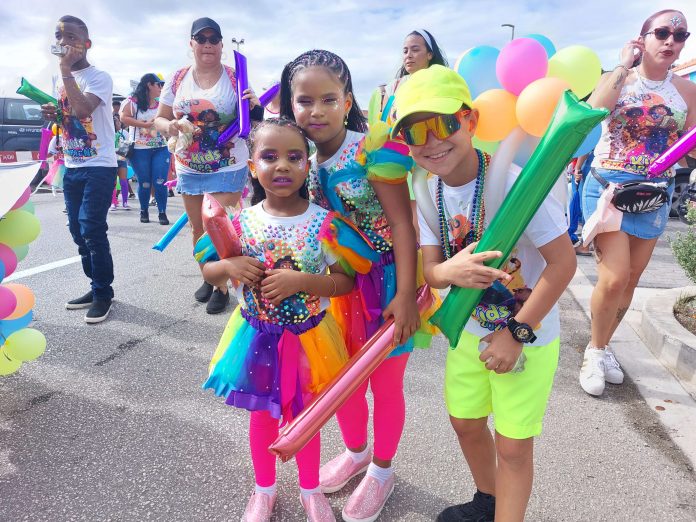(Oranjestad)—As usual during the carnaval season, different foundations are at work to bring awareness to the public, especially parents, about child care during the festivities. The ‘Pa Nos Muchanan’ (For Our Children) Foundation (FPNM) works tirelessly the whole year to help children, and highlights important information about child care during the carnaval season.
Natasha Gilkes, director at FNPM, explained during a press conference that in light of the fact that carnaval had already started and that not only adults participate in festivities, but children as well, there are some point to underline in order to secure the safety of children during parades and carnaval activities.
Firslty, Gilkes points out, it is extremely important to consider if the carnaval activities are even appropriate for children. For example, activities that go on in the late night hours, or those that take place during the day, but are specifically for adults. FPNM recommends leaving the children preferably with another responsible adult, either at home or daycare.
FPNM has a list of different available daycares that offer childcare during carnaval activities. Gilkes remarks that this list is just a recommendation and it is the parents’ responsibility to visit the daycares, ask questions, observe, and then make a decision.
She added that they also provide another list with important factors to keep in mind when choosing a daycare, so that this can make the process easier.
Gilkes explained that they recommend children participate in carnaval at the age of 4 or 5, but not without asking if the child wants to participate. If in case they don’t, it is then preferable to leave the child with a responsible adult, or that the parents’ stay home with the child and maybe do other fun activities.
If the child wants to participate, Gilkes said that they have another list with focus points on what to do to make the festivities fun, but safe for the child.
The focus point are as follows: From the moment of leaving the household, apply sun block on the child’s skin, and re-apply throughout the duration of the activity; dress the child with a hat or cap to protect their head and face; dress the child with loose clothing, preferably of cotton material with light colors to avoid too much heat. Lastly, provide the child with comfortable shoes.
Gilkes recommends packing a parasol, as it is not always possible to find a standing spot in the shade. In the case that parents do not have a trailer or tent, they must walk with a parasol or look for a spot in the shade, so that the child will not be directly exposed to the sun.
She added that it is important to also stay hydrated. Water and/or juice is recommended so the child can stay refreshed and hydrated. It is also important to keep in mind to not take any food that could go bad fast.
Another point that Gilkes underlines is to not lose the child during the parade. Unfortunately, this is something that happens every year, and this can be very damaging to the child. “Imagine a 6-year-old child who lost their parents. We know that parades are filled with people, so it is easy to lose sight of your child. To prevent this, please always be attentive to your child’s whereabouts,” she expressed.
FPNM recommends to also stick a paper on the child’s clothes with the child’s full name, names of the parents or caretaker, and telephone number for direct contact with the parents, in case the child is lost and is later found by the police or other people. Gilkes highlights that it is important to train the child to check their surroundings when their lost, in order to ask for help.
In the case that the child goes to watch the parade, it is important that the child stands behind the barricades, as there are trucks, smoke and other moving vehicles on the other side, which can also affect the child’s health.
In terms of loud noises, she reminds people that Qouta Club Aruba has worked for many years to raise awareness on wearing earplugs during carnaval festivities. “Please make sure your child has earplugs in. Qouta Club also sells these during parades,” she mentioned.
She also added that the parents must teach their children how and why to wear earplugs, as it may their first carnaval and the earplugs may be annoying. “It’s important to talk to them, explain why they have to wear earplugs in order to protect their hearing.”
Lastly, Gilkes informs that FPNM has a campaign every year, where interested parents or care takers can visit their office and get their folder “Carnaval and Children.” In this folder, there are different points to pay close attention to in order to ensure the safety of children. In addition to the folder, parents will also receive a sun block.




















